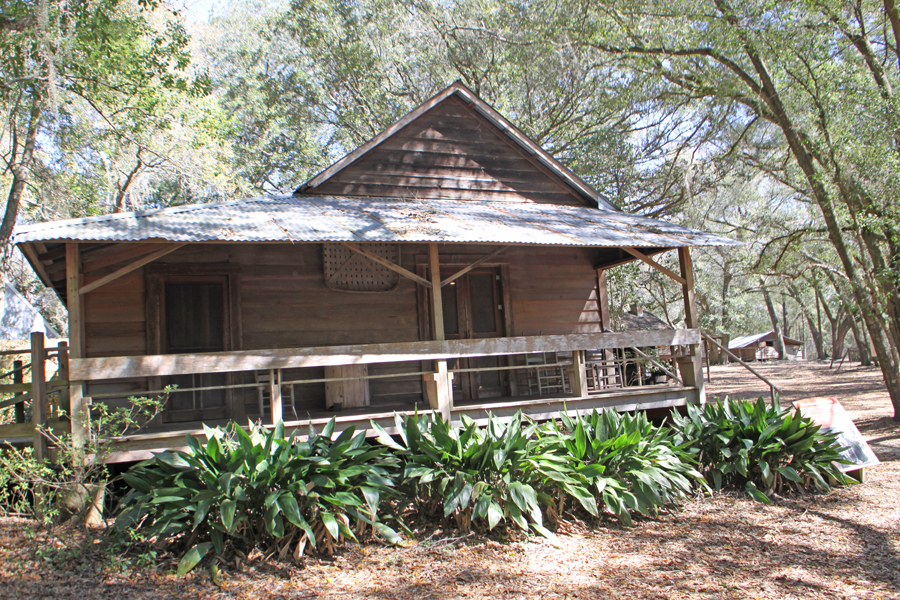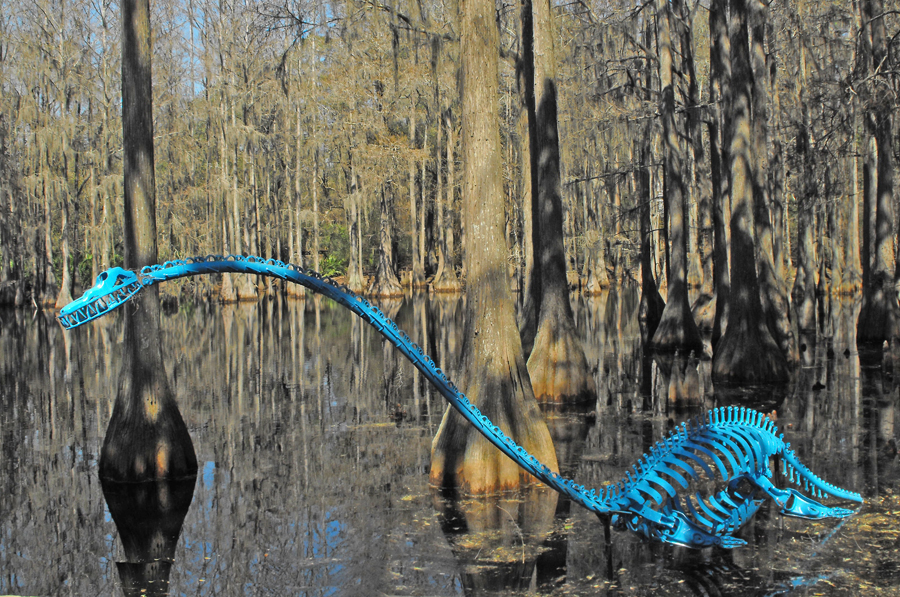
Tallahassee Museum
With most museums, you expect to find all
the exhibits tucked away neatly in a building. Tallahassee
Musuem is so different. It's like a time capsule of
Tallahassee's (and Florida's) cultural and natural history all
set in a natural outdoor environment on the shores of Lake
Bradford.
Florida's unique wildlife, like Florida
panthers and alligators are part of what make Florida, Florida,
right? But you could never shut up live panthers alligators, and
other Florida wildlife up in a building. So here they are
roaming in as close to natural habitat as possible.
Russell Daws, President and CEO of the
museum took me for a tour. Wow, I was impressed; Tallahassee
Museum's 52 acres combines the best of a zoo, living history
museum and park with a touch of art gallery thrown in for fun.
He explained the museum's goal,"What we do is talk about this
region's history and environment and how history and environment
work together to establish our identity and lifestyle here in
North Florida. I think we provide a great sense of place for the
Tallahassee region."
Zip Lines
He is so right. The museum is composed of
14 historic buildings and eight contemporary buildings. There is
a fantastic red caboose. Lots of places to play or just relax as
you learn about North Florida. Like the zip lines. I wouldn't
count them as relaxing but they do fall under the play heading
if you like your fun with a touch of excitement. There are three
lines; Tremendous Adventure for kids, Canopy Crossing for the
intermediates and Soaring Cypress for the really adventurous.
 |
| Section of kids zip line. |
The zip lines weave in and out of the
different sections of the museum. There is a Turpentine
Commissary and camp. Turpentine was an important part of
Florida's early economic development.
This one is realistic
with an authentic building for the commissary. It was moved from
an old camp in Pavo GA. The fun thing is that it is interactive.
I pressed a button and watched the Camp boss hiring a worker and
the work explained to him. It was a hard life for the workers;
little more than economic slavery. Workers were usually paid
with script only good at the company commissary.
 |
| Turpentine Commissary |
Big Bend Farm
Then we visited Big Bend Farm set to look
like the 1880s Building were all moved from farms around the
region. On weekends there are living history demonstrations with
docents in period dress. The blacksmith is one of the most
popular. One of the demonstrator cook on the wood stove. Don't
miss the old Studebaker buggy. And you can't miss the horse,
cows, pigs, sheep and geese.
 |
| Some of the Big Bend Farm
buildings |
Big Bend Farm has an active garden where
they grow sugar cane, cotton, greens and seasonal veggies among
other items.
Russell explained, "We have a partnership with a master garden
program and they come out and raise heirloom vegetables. We use
some in our Cafe. We do
a lot of farm to table event with local farms."
 |
| Garden at Big Bend Farm |
Old Florida
When I walked into the Old Florida section
of the Tallahassee Museum, the first thing that caught my eye
was the Seaboard Railroad Caboose. Railways were the lifeline of
rural north Florida back in the early 1920s. Seaboard Railroad
moved the farmer's cash crops into the cities and towns.
 |
| Bellevue |
The majority of those crops were grown on
places like the other highlight of the museum, Bellevue
Plantation. The Bellevue
plantations home was moved to the Florida Museum from its
original location on nearby Jackson Bluff Road and several of
the out buildings reconstructed. Bellevue portrays life in a
upper-middle-class southern plantation pre-Civil War. There were
many more Bellevues than Taras in reality so historically
Bellevue is a cultural treasure. It has a unique history as
well. Bellevue belonged to Catherine Murat. Catherine was the
grand niece of George Washington. She married Prince Achille
Murat, son of the deposed king of Naples and nephew of Napoleon
Bonaparte. Catherine Murat bought Bellevue after Prince Murat's
death around 1854 and lived there until 1867.
There is a strong element of African
American history here. Naturally, the period was one of turmoil.
Many of the former slaves remained on at the Bellevue as
employees after the war.
A slave cabin has been reconstructed to show the
lifestyles of the African Americans as well as the landed
gentry.
Another important building
is the Concord
Schoolhouse that was moved here from near the town of Miccosukee
in Leon County. The one-room schoolhouse was used to teach
former slave children and was used until the 70s.
Bethlehem Missionary Baptist is another
part of African American History at the Tallahassee Museum. It
was the first regularly organized black church in the State of
Florida built in 1851and rebuilt in 1937 by the congregation
using many of the original's hand hewn timbers. Its first
minister was Rev James Paige. The congregation still exists in
downtown Tallahassee.
 |
| Bethlehem Missionary Baptist |
Old Florida is also used for living history
demonstrations. The church is used for gospel groups and
weddings. Costumed docents cook over an open fire in the
reconstructed kitchen. Russell told of one occasion when one of
the interpreters handed him a plate with what he thought was
"the best roast beef I ever tasted. It was actually raccoon. She
didn't tell me until afterwards."
Wildlife Florida
One of my favorite sections of Tallahassee
Museum is the Wildlife Florida section. You arrive vie a Natural
Florida walk though oak, longleaf pine
and cypress filled area
surrounding Lake Hiawatha. Yopu are sure to see a few birds and
some turtles sunning in the lake. McGowan Butterfly Garden is a
haven for the fluttering jewels through their lifecycle.
When you reach the wildlife, there are all
the animals that live or once lived in Florida. There are about
half a dozen deer.
The two bears, one male and one female, each came to the museum
for different reasons. One
was a nuisance bear just a cub and couldn't be relocated. The
other has a sadder history. He was a cub whose mother had been
killed. The man that killed the mother took him prisoner and had
the cub chained behind his trailer. In capturing the cub, the
man had cut off part of his ear. Today, the bear lives a happy
life in a natural habitat. As close to the wild freedom these
magnificent creatures knew before Florida's human population
took over so much of their habitat.
 |
| Deer at the Tallahassee Museum |
There are lots of other animal residents
such as river otters, bald eagles, wild turkeys. hawks,
vultures, screech owls, great horned owls, wolves skunks and
foxes, both red and gray. I learned something I never
knew, Gray foxes climb trees. My
favorite animals are the panthers.
When I visited the two
new cougars were about half-grown and just losing their baby
spots. Both are female and adorable. The sad thing is that they
had to be brought in from Texas. Florida's native population,
according to best estimates, numbers only about 100 to 180 in
the wild. These magnificent cats once roamed all of Florida and
the Eastern states. The massive influx of people into what was
traditional panther habitat has made them highly endangered.
There are some cattlemen and hunters who
are not satisfied with moving into the panther's doman but are
now trying to do away with them altogether. Led by Florida
Wildlife Commissioner, Liesa Priddy, they are trying to pass
bills to take the big cats off the endangered species list and
allow hunting of these magnificent beasts. They are claiming the
cats are endangering their cattle. Well, the cats were there
first and the ranchers knew that when they moved into the
habitat. If they are really concerned, they could pack up their
cattle and move to other parts of the state or other states. The
panthers don't have that option. So enjoy seeing these beautiful
big cats in places where they are safe like Tallahassee Museum.
There is another adult male panther. He's a beauty but he just
took second place to the romping babies. Did you know, panthers
and cougars are the only big cats that purr?
 |
| Young panther at the Tallahassee
Museum |
It's obvious that the museum loves their
living inhabitants. The habitats are all natural and large.
There is a hospital facility for animals on site. Russell told
me they often have live animal presentations to teach
appreciation for Florida's wildlife. There is even a full
preschool program based on history and nature.
Art
Remember I said there is a bit of art
gallery here? I met that face to snout when a bright blue
dinosaur peered at me from the cypress swamp. The largest
collection of metal artist, Jim Gary's Twentieth Century
Dinosaurs reside at Tallahassee Museum. His Dinosaur collection
has showcased films, auto shows, museums and botanical gardens
around the world. The neatest thing about his dinosaurs is that
they are all crafted from recycled car parts.
What a way to combine conservation and art!
 |
| Jim Gary Dinosaur |
The museum is big on art of all types. They
have a amphitheater and stage that features events as different
as the Tallahassee Jazz and Blues Festival, Swamp Stomp (a
singer songwriter fest ) youth choruses and even ballet dancers.
And art exhibits range from folk art to local artists doing
things like Sketch Crawl where 20 local artists spent the day
sketching a variety of scenes around the museum grounds and the
city.
Of
course, there are modern buildings to explore: the Museum's
Discovery Center, Visitor Center, and Natural Science Building
and you can get a great meal at the Trail Break Cafe. But for
all around fun spend a day at this museum and explore all it has
to offer.
For more info:
http://tallahasseemuseum.org/
American Roads and
Global Highways has so many great articles you may
want to
search it for you favorite places or new exciting destinations.
|